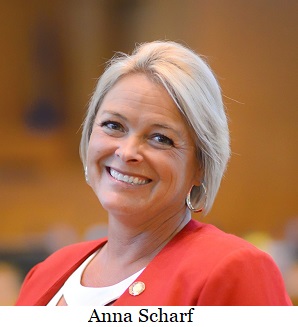Weight mile tax unconstitutional disparity increases
Oregon Representative Anna Scharf (R-Amity) and Senator Brian Boquist (R-Dallas) have filed a request for a one-day Special Legislative Session next month to rebalance the weight mile tax. They say Democrats have ignored an unconstitutional disparity in how heavy trucks are being taxed.
Article IX 3a of the Oregon Constitution requires the State Highway Fund to be fair and equitable to light and heavy users alike to ensure that cars and trucks pay their fair share of the usage of the road. Cars pay the gas tax, while diesel trucks pay their portion through the weight mile tax. Both pay registration fees.
The biennial Highway Cost Allocation Study (HCAS) is used to understand the cost responsibility of each class of vehicle. The 2021-2023 report showed that heavy vehicles were overpaying by 16%, while the 2023-25 report shows heavy vehicles are overpaying by 31%. During the 2023 session, the Majority party knew of this imbalance and refused to address it and have no plans to address it in the upcoming 35-day session in 2024. This leaves a Special Session to address this constitutional violation.
Based on the 2023-2025 HCAS, the Department of Transportation has estimated that trucks will overpay by approximately $193 million per year. That is over $500,000 in taxes being collected every day in violation of the State Constitution. While the weight mile tax is paid by trucks, the cost is passed onto Oregonians as increased prices on goods and services they use every day. The real people overpaying are the working class, seniors on fixed incomes, and families.
“Without trucks, families and communities in Oregon would not have access to the products they rely on. Yet, the State is knowingly overtaxing them in violation of the constitution,” Rep. Scharf said about her effort to call a Special Session. “It is more expensive to operate a truck in Oregon than any other state in the nation. We simply cannot force trucking companies and independent truckers to shoulder the burden of Oregon’s transportation taxes and continue to knowingly violate Oregon’s Constitution. A one-day special session can remedy this situation now.”
Under Article IV Section 10a of the Oregon Constitution, as outlined in
ORS 171.015, a member from each chamber may submit a formal request for a Special Session. Each member of the Legislature will be sent a ballot this week, and a majority of both chambers will need to vote in favor of the Special Session for it to take place. They have 14 days to return their ballot. The estimated date that a Special Session could take place would be the week of January 8th, which coincides with preplanned Legislative Days, a week in which lawmakers are already planning to be in Salem to prepare for the February Short 35-day Legislative Session.
A D V E R T I S E M E N T

A D V E R T I S E M E N T
Can an imbalance be resolved in such a short period of time? If you squeeze the balloon for large trucks cutting costs on the transportation budget, where will the bulge be absorbed? Scharf suggested Democrats should find money to make up any resulting budget shortfall for ODOT in other places.
Oregonians pay the eighth highest gas tax in the nation, which contributes to one of the highest prices at the pump. There is already a money problem with the attempt to ban new gas vehicles by 2035. The Oregon Department of Transportation relies on the gas tax and weight mile tax for revenue to maintain roads, bridges and for other projects. Since 2001, Oregon has piloted
OReGO where drivers voluntarily sign up to pay-per-mile driven. Currently the rate is under 2-cents per mile. A bill to make the program mandatory for everyone passed out of committee last session.
If rebalancing highway usage taxes becomes a reality, watch for pay-per-mile legislation to be pushed even though it presents a heavier burden on rural areas, creating another imbalance.
--Donna Bleiler| Post Date: 2023-12-20 11:23:38 | Last Update: 2023-12-19 22:04:58 |







